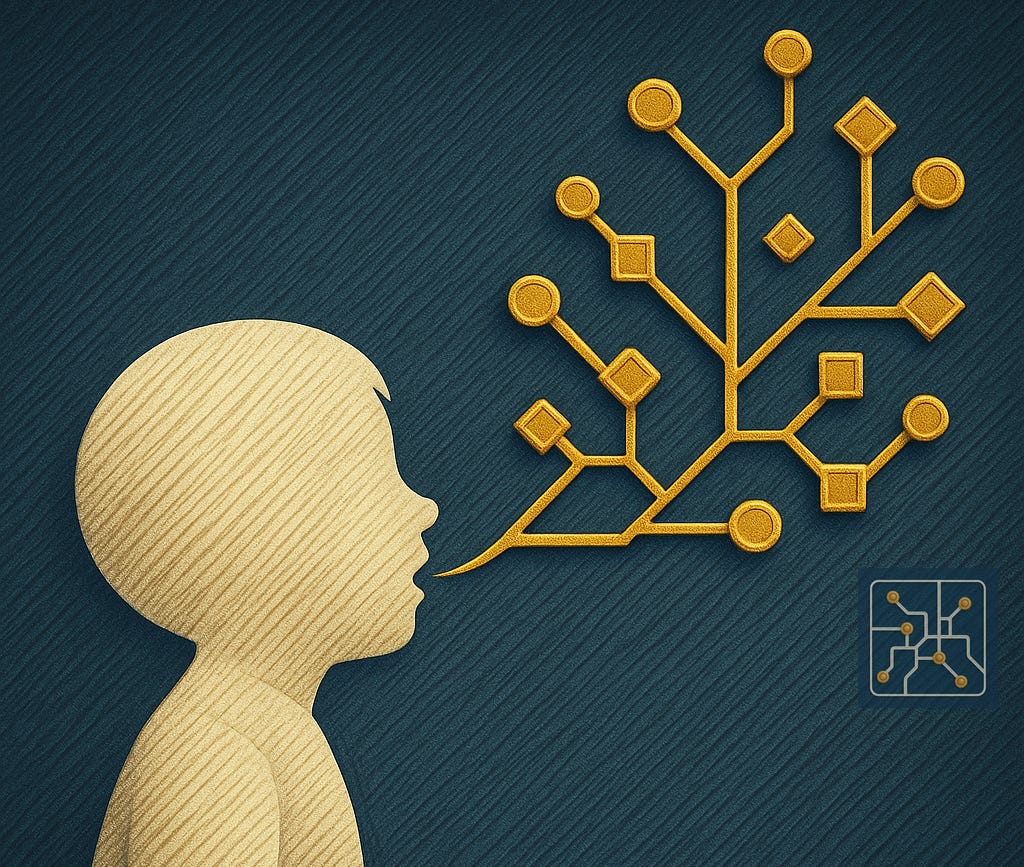The Prompt Generation
How growing up with AI may teach a generation to see clarity of expression as the path to understanding, success, and fairness.

There’s a chance the kids coming up now will be the Prompt Generation. The phrase sounds like branding, but the thing it names is real: an age band learning its habits of mind through an ongoing back-and-forth with machines.
Not the party trick of typing clever lines into a chatbot. I mean prompting as a way to move in the world: say what you want, name the limits, ask for another pass, wait for what comes back. If you spend time with these systems, the pattern seeps into ordinary talk. I catch it in myself: I reframe questions to friends, I sharpen asks to colleagues. When the result misses, I wonder if the ask was muddy.
That small shift could re-tune how a generation understands people, institutions, and what we call fair.
Beyond Questions
People like to reduce “prompt skills” to witty queries. But anyone who leans on AI for real work — shipping code, doing research, shaping a design — learns that questions are only the threshold. What matters is spelling out what “done” looks like: outcome, limits, resources, and tests.
In that richer sense, the prompt acts like a spec. Not a casual “what if,” but a working agreement between mind and machine. Intent: I need this solved. Constraint: but only under these conditions. Tests: here’s how we’ll know it worked.
Once, only specialists lived this way. Engineers, lawyers, philosophers made a craft of specification. Now AI hands that craft to children — early, maybe too early. If the habit sticks, they may grow fluent in abstraction, precision, and the rhythm of try, check, revise.
Fairness, Reframed
The more I work with models, the more I feel how clarity is tied to fairness. It’s hard to demand a particular outcome — from a system or a person — when I haven’t given them enough to work with.
Responsibility moves. Miscommunication becomes less a failure of will and more a reason to re-prompt: clarify, restate, try again. If that stance spreads, some of our hard edges might soften. Instead of jumping to malice or incompetence when things misalign, we might ask whether we set the frame clearly enough.
By that light, re-prompting reads not as failure but as a form of care.
The Positives
Agency. Words shape outcomes; refining the words is part of the job.
Practiced perspective. To prompt well, you imagine the other’s limits and tools — even when the “other” is a system.
Patience for passes. Misses become steps, not verdicts.
Precision as respect. Clear asks honor the listener’s role and constraints.
We already prize these in collaborators, teachers, leaders. Imagine them as default.
The Negatives
Every habit has a cost:
Spec absolutism. Treating people like APIs — as if the right string always fixes the world — erasing emotion, ambiguity, mystery.
Unequal fluency. Some kids will fly; others will trip over words and get left behind.
Metrics over meaning. The itch to measure everything until the uncountable goes quiet.
Blame-shift. “You didn’t prompt me right” as a dodge.
Prompt literacy could make us clearer and easier to work with — and still flatten the parts of life that rely on silence, intuition, and the unspoken hand-shake.
Earlier Grooves
We’ve watched this before. Print taught long, linear argument. Search taught speed: skim, compare, retrieve. Tools didn’t just change the kit; they cut new grooves in how thought moves.
So the Prompt Generation may learn to specify the way their parents learned to Google. Their default will be that problems get worked out in dialogue with a responsive partner — not always human, not always reliable, always there.
Politics, Work, Daily Life
Tilt the lens and you can already see it.
Politics: citizens asking for public prompts — what exactly is promised, under which conditions, and how we’ll check delivery. Slogans sound thin to ears trained on specs.
Work: meetings drifting from status to contracting outcomes. We grade not only the artifact but the ask.
Relationships: couples using re-prompting as repair. “I wasn’t clear about what I needed; let me restate.” Clinical now, maybe ordinary soon.
Consumer life: reviews as “Spec vs. Outcome”: what was said, what showed up, where it diverged.
Of course it can curdle — into bureaucracy, performance-speak, and intimacy lost under templates. But there’s also the chance that prompt-shaped fairness nudges us toward clearer, kinder exchanges.
The Unfinished Map
We don’t know how these kids will grow. Will specification come with empathy, or will life get reduced to contracts and interfaces? Will prompt literacy widen gaps, or settle in like reading — a basic skill everyone shares?
This much feels solid: conversation with AI won’t leave cognition untouched. Prompts aren’t only levers; they mirror how we think, expect, and relate.
Years from now, today’s youth may see that prompting wasn’t just how they spoke to machines. It taught them how to speak to one another. If that insight ripens with humility, the Prompt Generation might end up a little clearer — and maybe a shade kinder — than the ones before.

